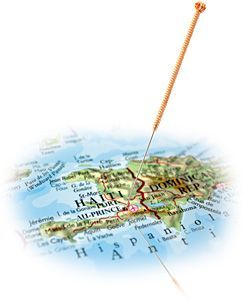The most important relationship I seek to nurture in the treatment room is the one a patient has with their own body. We live in a culture that teaches us to override pain, defer to outside authority, and push through discomfort. Patients often arrive hoping I can “fix” them, but the truth is, we can’t do the work for them. We can offer guidance, insight and support, but healing requires their full participation.
Serving Where Service Is Needed
Treating individuals as well as training medical professionals in Port-au-Prince, Haiti, was a phenomenal experience. As a volunteer with Acupuncturists Without Borders (AWB), I had the great privilege of traveling to Haiti twice. My first trip was in April 2010, three months after the earthquake; I went as a practitioner. My second trip was in August and I went as a trainer.
In April, we treated hundreds of patients and family members for post-traumatic stress disorder (PTSD) and pain management using the auricular five-point protocol of the National Acupuncture Detoxification Association (NADA). The results were remarkable and the Haitians became very interested in learning this simple, yet powerful protocol.
The following is an excerpt from my journal chronicling some of my experiences as a trainer while in Port-au-Prince in August- and how those experiences have impacted me since returning home.
Wednesday, Aug. 18, 2010

Yesterday was the last day of the official training which took place on the campus of Universite Quisqueya (aka UNIQ) begin to convey to you the pride that I feel - not because of what I've done so much, but rather because of the way the trainees stepped up and said "yes" to the monumental task of this training. Twenty-nine nurses, medical students, psychologists, herbalists and other medical practitioners took off work, commuted in crazy traffic and were on time and fully present each day. Their dedication to healing their nation is simply awesome!
We had so much to share. The training lasted about 28 hours over four days, and in that time we covered some of the basic philosophy of traditional Chinese medicine, taught clean-needle technique, exact location of points, and provided lots of needling technique practice with exposure to many treatment scenarios.
They were tasked with needling the very first day - we had them needle themselves at an easily accessible location on the body. Some were quite tentative at first and took a long time to get up the nerve to insert that first needle.
By Monday, the trainees were ready to work on other people, so we set up internship sites at Universite Quisqueya, Matthew 25 house and H.U.E.H. General Hospital (which, contrary to several rumors, is still open, with no intentions of closing). As we embarked on the last phase of the internship, the trainees were by then treating patients with confidence. We were confident in their abilities and intention to continue the work in helping Haiti heal.
We distributed the AWB certificates to the trainees today at the hospital (H.U.E.H)., while they worked on patients. They are well on their way.
Wednesday, Sept. 8, 2010
Now that I've been home for a while and have had a chance to reflect, to say that my time in Haiti was a rewarding experience would be a gross understatement. It is the spirit of community service, and the fact that the NADA protocol has been successful in so many types of community settings, that allows this protocol to stand out and be respected in many arenas.
In fact, here at home, I have begun to engage in reaching out to community-based organizations in the greater Los Angeles area. I am currently collaborating with the Watts Labor Community Action Committee (WLCAC) in the development of a comprehensive community clinic and treatment program that uses the NADA protocol and the full spectrum of TCM modalities. It is also my hope that, with WLCAC, we will partner this program with health care institutions in the greater Watts area. As we are successful in bringing this joint venture online, this will prove to be a partnership that will greatly contribute to the integrity of our profession and extension of our services to much-needed populations.


